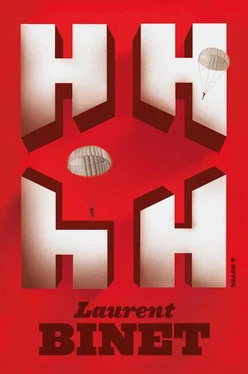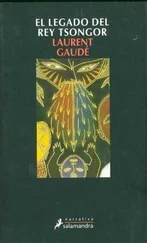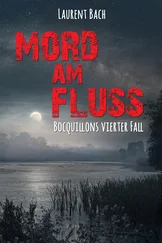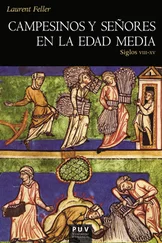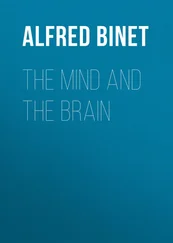Laurent Binet - HHhH
Здесь есть возможность читать онлайн «Laurent Binet - HHhH» весь текст электронной книги совершенно бесплатно (целиком полную версию без сокращений). В некоторых случаях можно слушать аудио, скачать через торрент в формате fb2 и присутствует краткое содержание. Город: New York, Год выпуска: 2012, ISBN: 2012, Издательство: Farrar, Straus and Giroux, Жанр: Историческая проза, на английском языке. Описание произведения, (предисловие) а так же отзывы посетителей доступны на портале библиотеки ЛибКат.
- Название:HHhH
- Автор:
- Издательство:Farrar, Straus and Giroux
- Жанр:
- Год:2012
- Город:New York
- ISBN:978-0-374-16991-6
- Рейтинг книги:3 / 5. Голосов: 1
-
Избранное:Добавить в избранное
- Отзывы:
-
Ваша оценка:
- 60
- 1
- 2
- 3
- 4
- 5
HHhH: краткое содержание, описание и аннотация
Предлагаем к чтению аннотацию, описание, краткое содержание или предисловие (зависит от того, что написал сам автор книги «HHhH»). Если вы не нашли необходимую информацию о книге — напишите в комментариях, мы постараемся отыскать её.
HHhH — читать онлайн бесплатно полную книгу (весь текст) целиком
Ниже представлен текст книги, разбитый по страницам. Система сохранения места последней прочитанной страницы, позволяет с удобством читать онлайн бесплатно книгу «HHhH», без необходимости каждый раз заново искать на чём Вы остановились. Поставьте закладку, и сможете в любой момент перейти на страницу, на которой закончили чтение.
Интервал:
Закладка:
I had rented an apartment for Aurélia in the center of Prague, between the castle of Vyšehrad and Karlovo náměstí (Charles Square). From this square runs a street, Resslova ulice, that goes down to the river, where you will find that strange glass building which seems to undulate in the air and which the Czechs call Tančící dům: the dancing house. On Resslova Street—on the right-hand side as you go down—there is a church. And in the church’s wall is a basement window bordered by stone where you can see numerous bullet marks and a plaque mentioning Gabčík and Kubiš—and Heydrich, whose name is now forever linked with theirs. I had passed this basement window dozens of times without noticing either the bullet marks or the plaque. But one day I stopped and read the words—and realized I had found the church where the parachutists took refuge after the assassination attempt.
I came back with Aurélia at a time when the church was open, and we were able to visit the crypt.
In the crypt, there was everything.
6
There were still fresh traces of the drama that had occurred in this room more than sixty years before: a tunnel dug several yards deep; bullet marks in the walls and the vaulted ceiling. There were also photographs of the parachutists’ faces, with a text written in Czech and in English. There was a traitor’s name and a raincoat. There was a poster of a bag and a bicycle. There was a Sten submachine gun (which jammed at the worst possible moment). All of this was actually in the room. But there was something else here, conjured by the story I read, that existed only in spirit. There were women, there were careless acts, there was London, there was France, there were legionnaires, there was a government in exile, there was a village by the name of Lidice, there was a young lookout called Valčík, there was a tram which went by (also at the worst possible moment), there was a death mask, there was a reward of ten million crowns for whoever denounced the gunmen, there were cyanide pills, there were grenades and people to throw them, there were radio transmitters and coded messages, there was a sprained ankle, there was penicillin that could be procured only in England, there was an entire city under the thumb of the man they nicknamed “the Hangman,” there were swastika flags and death’s-head insignias, there were German spies who worked for Britain, there was a black Mercedes with a blown tire, there was a chauffeur and a butcher, there were dignitaries gathered around a coffin, there were policemen bent over corpses, there were terrible reprisals, there was greatness and madness, weakness and betrayal, courage and fear, hope and grief, there were all the human passions brought together in a few square yards, there was war and there was death, there were Jews deported, families massacred, soldiers sacrificed, there was vengeance and political calculation, there was a man who was (among other things) an accomplished fencer and violinist, there was a locksmith who never managed to do his job, there was the spirit of the Resistance engraved forever in these walls, there were traces of the struggle between the forces of life and the forces of death, there was Bohemia, Moravia, Slovakia, there was all the history of the world contained in a few stones.
There were seven hundred SS guards outside.
7
On the Internet, I discovered the existence of a telefilm, Conspiracy , with Kenneth Branagh as Heydrich. I eagerly ordered the DVD—only five euros, postage and handling included—and it arrived three days later.
Conspiracy is a historical reconstruction of the Wannsee Conference, where, on January 20, 1942, in only a few hours, Heydrich and his assistant Eichmann set down the methods of enforcing the Final Solution. By this time, mass executions had already begun in Poland and the USSR but they had been entrusted to the SS extermination commandos, the Einsatzgruppen, who simply rounded up their victims by the hundreds, sometimes by the thousands, often in a field or a forest, before killing them with submachine guns. The problem with this method was that it tested the executioners’ nerves and harmed the troops’ morale, even those as hardened as the SD or the Gestapo. Himmler himself fainted while attending one of these mass executions. Subsequently, the SS had taken to asphyxiating their victims by cramming them inside trucks and hooking up the exhaust pipe to a length of hose, but the technique remained relatively unsophisticated. After Wannsee, the extermination of the Jews—which Heydrich entrusted to the tender care of his faithful Eichmann—was administered as a logistical, social, and economic project on a very large scale.
Kenneth Branagh’s portrayal of Heydrich is quite clever: he manages to combine great affability with brusque authoritarianism, which makes his character highly disturbing. I don’t know how accurate it is—I have not read anywhere that the real Heydrich knew how to show kindness, whether real or faked. But one short scene does a good job of showing his true psychological and historical nature. Two men at the conference are having a private discussion. One confides to the other that he’s heard Heydrich has Jewish origins and asks if he thinks there might be any truth to this. The second man replies venomously: “Why not go and ask him yourself?” His questioner goes pale at the thought. Now, it turns out that a persistent rumor claiming his father was Jewish did in fact pursue Heydrich for many years and that his youth was poisoned by this. Apparently the rumor was unfounded. But let’s be honest, even if that wasn’t the case, Heydrich—as head of the secret services of the Nazi Party and the SS—would have been able to erase all suspect traces in his genealogy without the slightest effort.
This is not the first time that Heydrich has made it to the big screen: in 1943, less than a year after the assassination, Fritz Lang shot a propaganda film entitled Hangmen Also Die! with a screenplay by Bertolt Brecht. This film recounts the events in a way that is utterly fanciful—Lang didn’t know what had really happened, and even if he had he naturally wouldn’t have wished to risk revealing the truth—but quite ingenious: Heydrich is assassinated by a Czech doctor, a member of the Resistance who takes refuge in the house of a young girl. Then the girl’s father, an academic, is rounded up by the Germans along with other local worthies and threatened with execution if the assassin doesn’t give himself up. The crisis, treated in an extremely dramatic way (thanks to Brecht, presumably), is resolved when the Resistance manages to pin the blame on a traitorous collaborator, whose death ends both the affair and the film. In reality, neither the partisans nor the Czech people got off so lightly.
Fritz Lang chose to represent Heydrich rather crudely as an effeminate pervert, a complete degenerate who carries a riding crop to underline both his ferocity and his depraved morals. It’s true that the real Heydrich was supposed to be a sexual pervert and that he spoke in a falsetto voice at odds with the rest of his persona, but his stiffness, his haughtiness, his absolutely Aryan profile, were worlds away from the mincing creature in the film. If you wanted to find a more lifelike screen representation, you should watch Charlie Chaplin’s Great Dictator again: there you see Hinkel, the dictator, flanked by two henchmen, one of them a smug, bloated fat man clearly modeled on Göring, and the other a tall, thin man who looks much colder, stiffer, and more cunning. That isn’t Himmler, a coarse little moustached fox, but rather Heydrich, his very dangerous right-hand man.
8
For the hundredth time, I returned to Prague. Accompanied by another young woman, the gorgeous Natacha, I went back to the crypt. (She’s French, this one, in spite of her name, and the daughter of Communists, like all of us.) The first day we went, it was closed for a national holiday, but across the road I spotted a bar—I’d never noticed this place before—called the Parachutists. Inside, the walls were covered with photos, documents, paintings, and posters relating to the assassination. At the back, a large painted mural depicted Great Britain, with points indicating the various military bases where the exiled Czech army commandos prepared for their missions. I drank a beer there with Natacha.
Читать дальшеИнтервал:
Закладка:
Похожие книги на «HHhH»
Представляем Вашему вниманию похожие книги на «HHhH» списком для выбора. Мы отобрали схожую по названию и смыслу литературу в надежде предоставить читателям больше вариантов отыскать новые, интересные, ещё непрочитанные произведения.
Обсуждение, отзывы о книге «HHhH» и просто собственные мнения читателей. Оставьте ваши комментарии, напишите, что Вы думаете о произведении, его смысле или главных героях. Укажите что конкретно понравилось, а что нет, и почему Вы так считаете.
